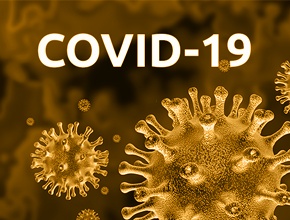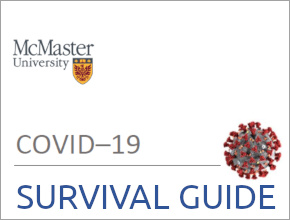Dr Waleed Alhazzani, associate professor in the Division of Critical Care at McMaster University, chair of Surviving Sepsis Campaign (SSC) guidelines, and lead author of the newest SSC guidelines focusing on coronavirus disease 2019 (COVID-19) in the critically ill, talks to Dr Roman Jaeschke about the use of corticosteroids in COVID-19 patients with and without ARDS.
References
Alhazzani W, Møller MH, Arabi YM, et al. Surviving Sepsis Campaign: guidelines on the management of critically ill adults with Coronavirus Disease 2019 (COVID-19). Intensive Care Med. 2020 Mar 28. doi: 10.1007/s00134-020-06022-5. [Epub ahead of print] PubMed PMID: 32222812; PubMed Central PMCID: PMC7101866.This interview was recorded on April 9, 2020.
For part 5 of this interview, click here. For part 7, click here.
Roman Jaeschke, MD, MSc: Good morning. Welcome to another edition of McMaster Perspective. This is the sixth part of an interview with the chair and first author of the Surviving Sepsis Campaign coronavirus disease 2019 (COVID-19) guidelines, Professor Waleed Alhazzani.
We were talking about supportive treatments and protection. Now it’s time to talk about therapies. The floor is yours.
Waleed Alhazzani, MBBS, MSc: Thank you again for inviting me. The question was about the current recommendations provided by the Surviving Sepsis Campaign group on the management of COVID-19 patients, specifically the therapeutic options.
As I’ve mentioned in the previous interviews, this guideline is going to be a living guideline and we will be updating recommendations as new evidence emerges. It’s highly possible that what we’ll say today will be less relevant tomorrow. Or maybe it will be accurate—who knows? It depends on the results of ongoing studies.
In the section discussing therapy we focused on a few interventions, including the use of corticosteroids, use of specific antimalarial agents that have some antiviral activity—specifically hydroxychloroquine—other antiviral agents, some immunomodulators, and interleukin 6.
For corticosteroids, our recommendation was divided into 2 sections. The first was focused on patients who present with COVID-19 without acute respiratory distress syndrome (ARDS). There isn’t much direct evidence to inform these recommendations, so we relied on previous evidence from other coronaviruses and indirect evidence from influenza as well. There are no randomized controlled trials (RCTs) looking at this specific question, so we relied also on observational studies. When the results are pooled together, it seems that there is a harm—I’m talking about the associated increased risk of death—if you give corticosteroids to patients with influenza who are admitted to the hospital. The evidence was less clear, or inconclusive, when it comes to other coronaviruses, like Middle East respiratory syndrome coronavirus (MERS-CoV) or severe acute respiratory syndrome coronavirus (SARS-CoV). There was a lot of heterogeneity, so it wasn’t very helpful. Also, there is a lot of concern about increased viral shedding and, potentially, prolonging the duration of viral replication, at least from previous observational studies in other viral contexts.
When they put everything together, the panel decided to issue a conditional, or weak, recommendation (that is, a suggestion) against the routine use of corticosteroids in these patients. It is likely that some patients might benefit from corticosteroids and some will be harmed, but at this point we don’t know this. Because the collective body of evidence from indirect evidence doesn’t show clear benefit and there’s potential harm, we thought a weak suggestion is justified for now, until further studies come out and refute or confirm these observations. So that’s the first part.
The second part was focused on the sicker population: the patients with ARDS. We’re only talking about those who have classic ARDS that is moderate or severe and are in the intensive care unit (ICU). There is a decent body of evidence from RCTs in all patients with ARDS—not specifically patients with COVID-19, as we are still early in the course of this disease and the world is still learning about its behavior and response to therapy, so all recommendations will be based on indirect evidence.
Having said that, when these RCTs—I think there were 6 or 7—were pooled together, they showed a reduction in the risk of death if you give systemic corticosteroids to patients with ARDS who are mechanically ventilated. There was also a shorter duration of mechanical ventilation.
By the time we published this recommendation, there was only one retrospective study that came out of China. In that study patients with ARDS who received steroids had a lower risk of death compared with those who didn’t receive steroids. Again, it’s an observational study, but the point estimate was consistent with the indirect evidence from RCTs. Therefore we suggested issuing a weak recommendation for using corticosteroids in this population.
I have to mention that there were a few panel members who preferred that we did not issue a recommendation. They felt that there is a huge uncertainty regarding this aspect that wouldn’t warrant a recommendation at this point.
The good news is that there are ongoing RCTs at the moment that will allow us to make a more informed recommendation in the future.
Roman Jaeschke: We give suggestions to use steroids in ARDS but not to use them in COVID-19-related pneumonia. Sometimes it may be difficult to distinguish between these two. Any comments?
Waleed Alhazzani: It’s a great and challenging question. ARDS is a syndromic presentation. It’s likely a condition that has several phenotypes.
We did not address this specific point in the guideline, so whatever I’m going to say represents my own opinion.
Patients who have classic ARDS usually have poor lung compliance, very stiff lungs, and they meet the criteria of the Berlin definition that we talked about previously [see COVID-19: CPGs for critically ill patients. Part 4: More on ventilatory support]. The recent anecdotes or impression when talking with colleagues who have seen a large number of patients in their centers is that in most patients who are hypoxemic in the ICU and have at least normal or moderate lung compliance they felt that the mechanism of hypoxemia is not directly related to ARDS itself and that it was probably related to other mechanisms. Therefore clinicians should use their best judgement and experience when trying to decide whether these patients have ARDS. There is no clear-cut distinction. But I would say those with poor compliance, requiring high pressures to improve oxygenation, those are probably the patients who have ARDS and they should probably be treated within the context of ARDS.
 English
English
 Español
Español
 українська
українська










